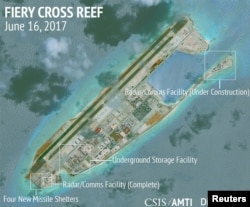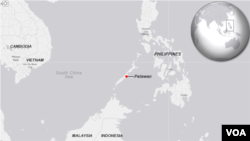A proposed 60-40 split favoring the Philippines over China in rights to any oil or gas discovered together in a contested sea helps Beijing protect an iffy but valuable diplomatic relationship with Manila and prove its neighborly credentials in other parts of Asia, analysts say.
The foreign minister under Philippine President Rodrigo Duterte was quoted saying July 31 Beijing is willing to take the minority stake in any fossil fuel discoveries found under a tract of the South China Sea where the two countries have competing sovereignty claims.
A minority stake for China would help Beijing prove itself to a skeptical Philippine public, analysts say. Philippine President Duterte has sought strong relations with China since he took office in 2016 by laying aside their maritime sovereignty dispute. China has offered aid and investment in return. But polls have shown many Filipinos still do not trust China.
The two countries once vied bitterly over the South China Sea, culminating in Manila’s victory in a world arbitration case two years ago.
“This plan for the government has received a lot of criticisms, because others would argue if these areas are in the exclusive economic zone of the Philippines, that belongs to the Philippines and it should not be shared,” said Maria Ela Atienza, political science professor at the University of the Philippines Diliman.
Unsettled dispute, Chinese military strength
Duterte advocates friendly ties with China because, he says, the Philippines could not win a war with the country. China, which commands Asia’s strongest armed forces, has built military installations on three islets in the Spratly Islands, a South China Sea archipelago that each side claims as its own. Brunei, Malaysia, Taiwan and Vietnam also dispute rights to the Spratlys.
Chinese vessels pushed Filipino fishing boats out of Scarborough Shoal near the Philippine island Luzon in 2012, plunging relations and leading to the arbitration case that wrapped up in 2016.
Some Filipinos cite constitutional issues with letting China explore for fuel under a sea that the Philippines calls its own. Others point to private oil firms, for example from Japan, that are willing to develop undersea gas and oil without a sovereignty hassle, Atienza said.
Goodwill toward the Philippines
China, if it inks the deal, would be taking 40 percent to show goodwill toward the Philippines, which might otherwise tap China’s geopolitical rival the United States for help, experts say.
“Joint development in the Philippines is a contentious issue with respect to provisions in the Constitution,” said Carl Thayer, a Southeast Asia-specialized emeritus professor at the University of New South Wales in Australia.
“By agreeing to a lesser portion, China seeks to disarm domestic opposition by Filipinos,” he said. “President Duterte has taken a more conciliatory stance and China is eager to capitalize on this, hoping to pressure other states to follow suit.”
A deal to explore off the coast of the Philippine island Palawan with a consortium of private firms would also give the government a 60 percent share of revenues.
A message for other Asian countries
China wants to placate not just the Philippine but also other Southeast Asian countries with competing maritime claims, analysts believe. Shows of goodwill could mute impacts of the arbitration ruling, which rejected the legal basis for Chinese maritime claims, and stop other countries from seeking aid from the United States, they argue.
A conciliatory oil deal could resonate around Asia where China is developing infrastructure as part of its $1 trillion, 5-year-old Belt and Road initiative, said Alan Chong, associate professor at the S. Rajaratnam School of International Studies in Singapore.
Beijing wants to keep favor with the 10-member Association of Southeast Asian Nations as the two sides discuss a code of conduct for avoiding accidents in the disputed sea, he added.
“I think this is one way of signaling that China is willing to be different kind of aid giver,” Chong said. “And then I think China wants to help Rodrigo Duterte a little, because he’s facing a lot of criticism from his own countrymen about selling out to China, ‘you’re being cozy with China, and you’re not getting very much in return.’”
China’s end of the deal
China might not go for a 60-40 deal requiring that a Chinese drilling company get a license from the Philippines under Philippine law, said Gregory Poling, director of the Asia Maritime Transparency Initiative under the American think tank Center for Strategic and International Studies.
But a purely commercial license could eliminate political disputes, said Alexander Huang, strategic studies professor at Tamkang University in Taiwan.
China might not come through on its pledge, he warned. “China sometimes does not have the good reputation of fulfilling its capital commitment,” he said. “From the very beginning there are many reports, but sometimes the funding [is] not met.”






